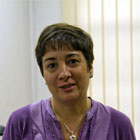"If we don't guarantee income and housing to crisis victims,
the cost for society will be much greater"

An interview with Mercè Darnell, Càritas Barcelona.
Involving stakeholders, and particularly those representing the interests of groups affected by inequality, is one of the main objectives of SOPHIE. Caritas Barcelona is a very special kind of stakeholder as it has been involved in the project from the very beginning as a partner. Mercè Darnell is one of the first persons we got in touch with, and the Head of Programs and Services of the organisation.
Could you explain to a foreigner the task of Caritas?
Caritas is the Catholic Church's social action entity. Its three missions are: to welcome, listen and try to help the most disadvantaged people in each historical moment;, to make aware the society of the situations of suffering; and to denounce all situations of injustice. 80-90% of our revenues come from private funds, which provides us freedom to denounce and ability to have resources to help in these times of crisis.
What is your lived experience of how poverty, inequality and bad policies affect people’s health?
We witness directly how the crisis and the lack of social protection policies affect people’s daily lives and makes them physically and psychologically sick. Mental health is affected in two patterns: people that gets desperate and anxious, and people who have thrown in the towel, fallen into depression, and say “I leave my life in your hands, I surrender”. Another basic factor - also from a mental health perspective - that sometimes we do not value enough is the loss of daily routines. More and more people in Catalonia start the first days of the month with no steady income, no security. When your life is “how will I make through the day”, the prospect of an agenda, a meeting, a commitment makes no sense.
Physical health also deteriorates. You eat what you can afford or get through the day. This results in an unbalanced diet, sometimes even missing meals. Children eating not enough means that parents, especially women, have eaten even less. Another issue that we see is the worsening of diseases that people already have: back pain, headaches, skin problems, stomachaches... And finally we see how waiting times for visits or tests grow, leading to chronification of problems.
Could you quantify all these phenomena?
It is difficult to talk about numbers. According to SOPHIE’s first findings, 70% of adults with housing problems that we surveyed had poor mental health. The majority of people that we are attending are sick. If we talk about the bio-psycho-social concept of health, nobody that we attend can be included. People in poverty suffer. They just survive. Sometimes they normalize their anguish and suffering situation, as they have not seen anything better around.
What about good policies, and what would be the recommendations to improve the lives of people that you are working with?
Of course the basic issue is employment. Incentives to not-for-profit enterprises providing jobs to hard-to-employ sectors can be one small way forward. Employment and social inclusion of these people save money for the state.
But as macroeconomic figures predict many years to have a “reasonable” unemployment rate, in the meanwhile, a minimum income that allow a decent living and a decent, affordable housing have to be assured to everyone. If we do not guarantee this minimum vital figure, in 10 years from now, even if jobs are created, many people will not be able to work. The personal deterioration process produced by lacking this basics is hardly considered. It will cost more to get people out of social exclusion than guaranteeing housing and income now. Going to work is the last step in the chain.
Is it useful for your everyday task to become involved in a European research project?
We participate in European projects such as SOPHIE, we visit other countries and prospect the “research world” because it is the only way to approach problems properly and going beyond the immediate circumstance we have in front. To be more effective and efficient in our help we need to research and to read about what are the best policies. For instance, we learn from research that investing in early childhood is vital, so guaranteeing a minimum for subsistence must be a priority. Or that the "housing first" approach is more effective with homeless people. Sometimes, however, the university research results are kept in a shelf or they are just incomprehensible or not applicable.
At this regard, is there any message you would like to send to all SOPHIE partners and friends?
[Laughs] How difficult! They should find a way to communicate effectively what is discovered that may be applied by social organizations. They must be able to land research results. Not just giving general policy orientations, but also drawing objectives, activities, and reaching a level of precision useful for real partners. Sometimes big policies are suggested and proposed to be applied as a whole and fully, but we need to start somehow.
